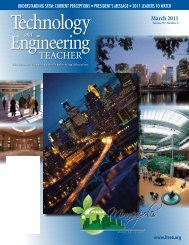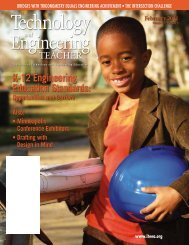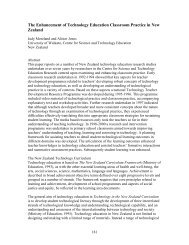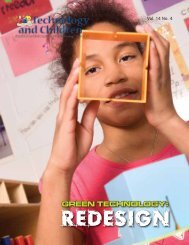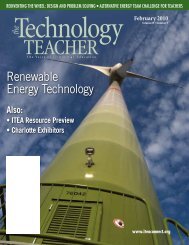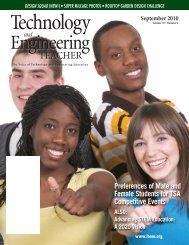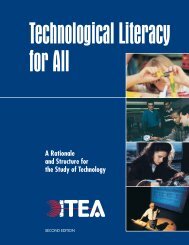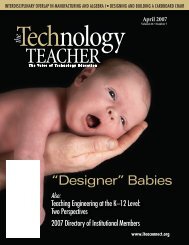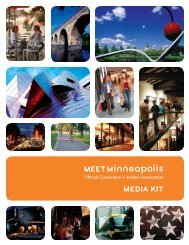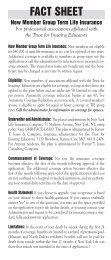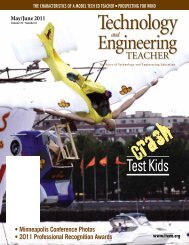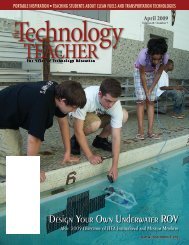Teaching Elements and Principles of Bridge Design - International ...
Teaching Elements and Principles of Bridge Design - International ...
Teaching Elements and Principles of Bridge Design - International ...
You also want an ePaper? Increase the reach of your titles
YUMPU automatically turns print PDFs into web optimized ePapers that Google loves.
MASTERING THE ESSENTIALS FOR A CAREER IN<br />
TECHNOLOGY EDUCATION<br />
FEATURE ARTICLE<br />
Harry T. Roman<br />
Prologue<br />
In this article, I shall endeavor to set<br />
an ideal, a personal wish list if you<br />
will, for what I believe are the key<br />
areas <strong>of</strong> competency young<br />
technology education teachers should<br />
be developing while still in college.<br />
Not being an educator in the<br />
traditional sense, I write from the<br />
perspective <strong>of</strong> an engineer <strong>and</strong><br />
inventor who has spent considerable<br />
time interacting with the educational<br />
community. In this paper, I pr<strong>of</strong>ess<br />
by default to be a member <strong>of</strong> “the<br />
tech ed school <strong>of</strong> hard knocks” <strong>and</strong> a<br />
long-time devotee <strong>of</strong> tech ed<br />
principles <strong>and</strong> practices.<br />
I hope you find my thoughts both<br />
relevant <strong>and</strong> challenging, appreciating<br />
the perspective from which they<br />
originate.<br />
The Wish List<br />
There is no priority or preference<br />
inherent in this listing <strong>of</strong> preferred<br />
competencies. They are the<br />
requisites I have personally compiled<br />
over the years based on my<br />
experiences. I have tried to group<br />
them for convenience.<br />
Some Basics for Action:<br />
Definitions <strong>and</strong> Distinctions<br />
Being able to clearly draw<br />
distinctions between the definitions<br />
<strong>of</strong> science, technology, <strong>and</strong><br />
engineering would be ideal. Our<br />
society <strong>of</strong>ten blurs the lines between<br />
these important terms. Tech ed<br />
teachers should see clearly the<br />
distinctions. Science is about<br />
discovery, while engineering is about<br />
application in the real world.<br />
Technology is the know-how to make<br />
what we want from what we have<br />
(resources) <strong>and</strong> is the main creative<br />
Over 60% <strong>of</strong> the annual growth in our<br />
nation’s economy is directly attributable to<br />
scientific <strong>and</strong> technological advances.<br />
tool <strong>of</strong> the engineer. Engineering <strong>and</strong><br />
tech ed share much common<br />
ground—the human designed<br />
world—achieved in a benign,<br />
beneficial, <strong>and</strong> cost-effective manner.<br />
Most definitely, the links to<br />
engineering must be brought into the<br />
tech ed classroom.<br />
Because <strong>of</strong> the close relationship that<br />
tech ed has with engineering, wouldbe<br />
tech ed teachers should have<br />
some form <strong>of</strong> interaction with<br />
working engineers as well as a<br />
sense <strong>of</strong> their pr<strong>of</strong>ession <strong>and</strong> the<br />
problem-solving regimen used by<br />
engineers in their daily work. A study<br />
<strong>of</strong> the history <strong>of</strong> engineering <strong>and</strong> its<br />
roots in ancient times would be <strong>of</strong><br />
significant value. Most, if not all, <strong>of</strong><br />
the seven wonders <strong>of</strong> the ancient<br />
world were largely engineering feats.<br />
Students should be familiar with<br />
great engineers <strong>of</strong> the world <strong>and</strong><br />
their contributions. The first man on<br />
the moon was an aeronautical<br />
engineer! Five U.S. presidents were<br />
engineers (can you name them?). It is<br />
highly likely that a good portion <strong>of</strong> the<br />
students that tomorrow’s tech ed<br />
teachers influence will become<br />
engineers, <strong>and</strong> best that engineering<br />
be discussed at the K-12 level.<br />
It is also imperative that tech ed<br />
teachers fully underst<strong>and</strong> that<br />
technology long preceded science.<br />
There are thous<strong>and</strong>s <strong>of</strong> years <strong>of</strong><br />
successful tool-making behind such a<br />
premise; but formal science as we<br />
recognize it today is a mere 500<br />
years old. Technology is the mortar<br />
between the bricks <strong>of</strong> science, the<br />
empirical glue that holds the<br />
structure together.<br />
Good Communications<br />
The basis <strong>of</strong> all academic, <strong>and</strong><br />
eventually corporate performance, is<br />
good communication. This bedrock<br />
skill set comes in both oral <strong>and</strong> written<br />
form <strong>and</strong> should span the gamut from<br />
short thematic writing to a fully<br />
researched project paper complete<br />
with formal footnotes, references, <strong>and</strong><br />
bibliography, to the development <strong>and</strong><br />
presentation <strong>of</strong> original work via formal<br />
slide formats followed by Q&A. Ideally,<br />
I would also recommend that tech ed<br />
career aspirants be able to respond to<br />
extemporaneous speaking challenges<br />
too. A powerful way to drive this<br />
message home to would-be tech ed<br />
teachers is to grade their work twice,<br />
once for its “technical” rigor <strong>and</strong> once<br />
for its “communications clarity.” That<br />
would do the trick <strong>of</strong> reinforcing the<br />
importance <strong>of</strong> good communications.<br />
All tech ed teachers should have<br />
numerous opportunities during their<br />
undergraduate experience to<br />
participate in <strong>and</strong> lead team problemsolving<br />
exercises. It is important to<br />
gain extensive experience with how<br />
this powerful educational tool should<br />
be used in the classroom. In my<br />
observations, this technique is what<br />
sets apart the tech ed experience from<br />
activities in which other teachers<br />
partake, <strong>and</strong> it is the fundamental<br />
reason why tech ed is successful in<br />
integrating the curricula.<br />
The Value <strong>of</strong> Mathematics<br />
It is not sufficient to be good at math.<br />
Tech ed teachers must be able to<br />
apply it, respecting it as another tool<br />
that helps them underst<strong>and</strong>, quantify,<br />
<strong>and</strong> bound the world for their students.<br />
The ability to estimate, ballpark, <strong>and</strong><br />
36 April 2005 • THE TECHNOLOGY TEACHER



